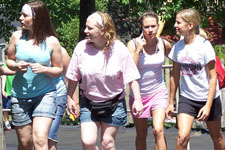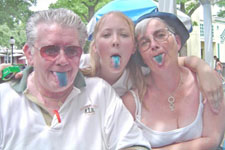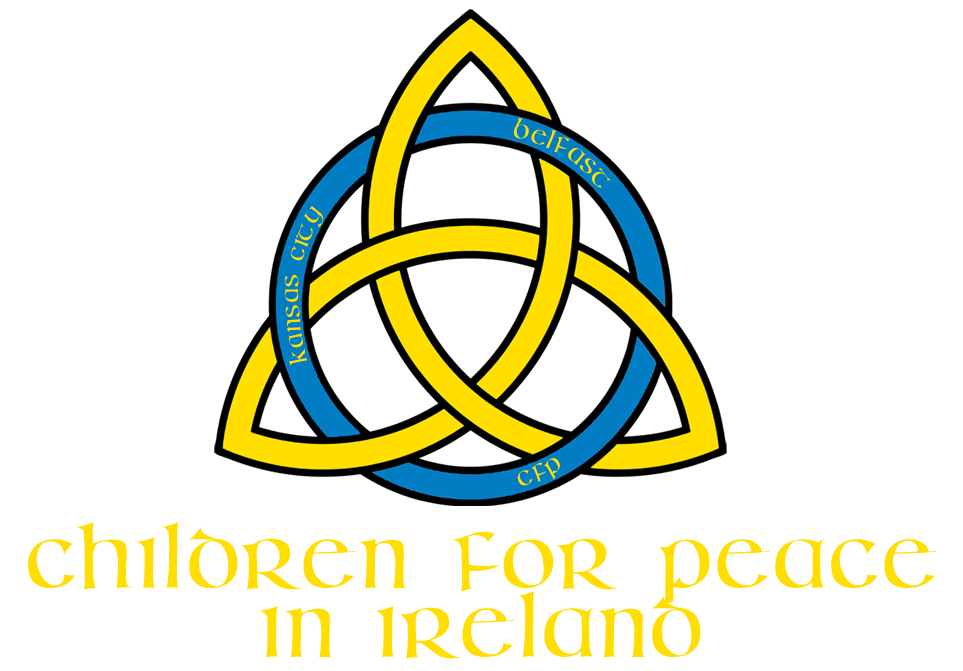History of CFP
Peace from the Troubles
 The history of Children for Peace stems from the history of the period of civil unrest known as “the Troubles” which claimed the lives of over 3,500 people and devastated local communities across Northern Ireland in more than three decades of armed conflict. During this period, no one group was more affected than Northern Irish young people who were recruited by paramilitary groups on both sides of the conflict and drilled in martial principles of violent resistance and sectarian loyalty during the formative years of their young adulthood.
The history of Children for Peace stems from the history of the period of civil unrest known as “the Troubles” which claimed the lives of over 3,500 people and devastated local communities across Northern Ireland in more than three decades of armed conflict. During this period, no one group was more affected than Northern Irish young people who were recruited by paramilitary groups on both sides of the conflict and drilled in martial principles of violent resistance and sectarian loyalty during the formative years of their young adulthood.
On 10 April 1998, a historic peace was reached with the signing of the Good Friday Agreement which officially brought an end to the armed conflict in Northern Ireland.
For more information on the history of the Troubles visit: www.cain.ulst.ac.uk
CFP Beginnings
During the height of the Troubles, a program in Kansas City was founded under the leadership of Phil Chaney and named “Ulster’s Children for Peace” which sponsored eight Protestant and Catholic young people from Northern Ireland over a three year period from 1989-91.
Following Good Friday in 1998, Dennis Conaghan, a teacher at Kansas City’s Notre Dame de Sion High School, established contact with then Deputy Lord Mayor of Belfast, Mrs. Marie Moore, and discussed his interest in resurrecting a program to bring young people from Northern Ireland to the Kansas City area in support of the incipient peace in the North. Moore suggested Conaghan contact Tom Quinn of the Ancient Order of Hibernians (AOH) in Kansas City. In short order, Conaghan and Quinn drew up the blueprint of a program with the help of Phil Chaney, and a motion was put forth to the Padraig Pearse Division of AOH in 1999 who unanimously supported it and established the AOH Children for Peace in Ireland Committee.
In July 2004, AOH Children for Peace in Ireland (CFP) was established as an independent 501(c)(3) non-profit, Public Charity Corporation.
In 2006, CFP further developed its local organization in Northern Ireland by appointing Raymond Stewart and Dominic Mooney Program Coordinators. Both Stewart and Mooney brought years of extensive experience to CFP with their work promoting peace and understanding of differences among young people from diverse communities in Belfast, Northern Ireland.
Beginning with CFP’s first sponsored trip in July 2000 which included two boys and five girls, today the program sponsors sixteen young people from Northern Ireland annually: half catholic, half protestant, half boys, half girls.
The CFP Program
Each year, CFP sponsors sixteen young people, aged 14-17, from Northern Ireland and brings them to Kansas City to live with host families and participate in group activities with American peers for two weeks during July.
The young people sponsored by CFP will meet a minimum of six times prior to traveling to America to give them the opportunity to become familiar with each other and their differences under the direction of CFP Program Coordinators.
Host families and American teens are also given the opportunity to travel to Northern Ireland with CFP's Executive Director each year during the early part of June to familiarize themselves with the cultural and economic situations out of which the Northern Irish teens arrive.
During both trips CFP's educational program is designed to engage American and Northern Irish young people by encouraging them to confront personal, cultural, and political differences with constructive dialogue and develop an enduring respect for peace and civil rights.
CFP's Objectives
 CFP’s program is designed to engage young persons from Northern Irelandandthe United States in recognizing a common history in the struggle for peace and civil rights and to provide our youths with the tools to confront their differences and all obstacles to peace that arise along their path to adulthood. A coordinated program of events maintains focus on these goals throughout the course of the CFP program year, culminating in CFP participants’ annual meeting in Kansas City. By building a strong network of individuals – host families, volunteers, and friends of CFP – in Kansas City and Northern Ireland , the CFP community supports these lessons in CFP teens and keeps them actively involved in the program for many years.
CFP’s program is designed to engage young persons from Northern Irelandandthe United States in recognizing a common history in the struggle for peace and civil rights and to provide our youths with the tools to confront their differences and all obstacles to peace that arise along their path to adulthood. A coordinated program of events maintains focus on these goals throughout the course of the CFP program year, culminating in CFP participants’ annual meeting in Kansas City. By building a strong network of individuals – host families, volunteers, and friends of CFP – in Kansas City and Northern Ireland , the CFP community supports these lessons in CFP teens and keeps them actively involved in the program for many years.
Our Logo
The CFP Logo is a Triquetra (Latin: “three-cornered”) Knot. A common representation of the symbol includes a circle which interconnects the three loops of the Triquetra. CFP’s use of this symbol represents the interconnection of the three communities we service: Kansas City, Belfast, and all our participants and partners in Children for Peace.
Our Mission Statement:
Children for Peace in Ireland, Inc. (CFP) is a 501(c)(3) Non-Profit Organization that is dedicated to building stronger families and communities by enhancing the awareness of cultural diversities and the education of the youth we serve.
CFP Program Costs
 CFP's program costs have increased significantly as we've increased the number of young people we sponsor. In order to maintain the effectiveness of the program for the current sixteen Northern Irish teens, CFP must raise funds to cover all costs in donations annually. This sum includes the cost for expenses such as: Airfare, Summer Activities, Bus Transportation for Activities, Insurance for the Young People, Education Residentials in Northern Ireland, Legal and Professional Fees, Storage Lockers, Supplies, Printing, Postage, etc.
CFP's program costs have increased significantly as we've increased the number of young people we sponsor. In order to maintain the effectiveness of the program for the current sixteen Northern Irish teens, CFP must raise funds to cover all costs in donations annually. This sum includes the cost for expenses such as: Airfare, Summer Activities, Bus Transportation for Activities, Insurance for the Young People, Education Residentials in Northern Ireland, Legal and Professional Fees, Storage Lockers, Supplies, Printing, Postage, etc.
CFP relies on the generosity of private donors to make up all the funds necessary to continue this program. If you would like to make an investment in our project to promote peace and responsible citizenship in young people, please visit the Contribute section of this site which will direct you to make a tax-exempt donation securely via PayPal.
CFP Outlook
CFP's educational program is reviewed each year to maintain the program's relevance to the dynamic situations facing young people in our respective communities. In this section we link to relevant news articles that highlight the kinds of issues in our community we believe are within the program scope of CFP to address.
Who We Are
 The CFP Management Team consists of the CFP Board of Directors, CFP Executive Director Tom Quinn, and Northern Ireland CFP Program Coordinators Raymond Stewart and Dominic Mooney with the support of local volunteer staff and friends of CFP around the world.
The CFP Management Team consists of the CFP Board of Directors, CFP Executive Director Tom Quinn, and Northern Ireland CFP Program Coordinators Raymond Stewart and Dominic Mooney with the support of local volunteer staff and friends of CFP around the world.
